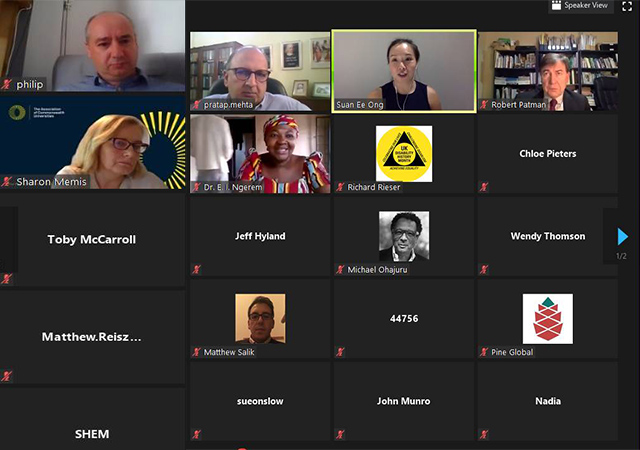
As lockdown continued in much of the world, the Institute of Commonwealth Studies (ICwS) took the opportunity to focus a virtual audience’s attention on the role of the Commonwealth and lessons to be learnt from the global coronavirus pandemic.
ICwS Director Phillip Murphy opened the 24 June Taking Stock Of The Commonwealth conference by stating that the all-day session would look at the world after COVID-19 and what the pandemic meant for the “daily texture of human life”.
The choice of panellists indicated the ICWS thinking on where the answers were to be found. The Chief Operating Officer of the Association of Commonwealth Universities (ACU), Sharon Memis, said in opening that “universities will be part of the solution” after COVID-19. She stressed the need for interested parties to look at the good stories, the real concerns and the opportunities.
Suan Ee Ong, of the Saw Swee Hock School of Public Health at the National University of Singapore, raised the lesson of her country, cited as an initial success story in curbing the spread of the virus only to find a surge from the locked down migrant communities. In what she described as “a tale of two outbreaks”, she spoke of the “PR crisis” as virus numbers increased because of the rise in vulnerable communities. Describing these communities as a “blind spot”, she said that Singapore’s initial approach to fighting COVID-19 had missed “our migrant workers who build our skyscrapers”.
Professor Robert Patman of the University of Otago in New Zealand spoke of his country’s Prime Minister, Jacinda Adern, describing her as one of the politicians who combined empathy and compassion with an ability to “take steps to address the causes of pain”. He said she had listened carefully to health care professionals, looked at successful models in other countries and carried her community with her. Professor Patman said that nations which had listened to the World Health Organisation and looked at examples from other countries had done well in coping with the coronavirus pandemic.
The former Vice-Chancellor of Ashoka University and President of the Centre for Policy Research in New Delhi, Professor Pratap Bhanu Mehta, said that India had started well after lockdown, but then “frittered” this advantage away by ignoring its migrant labour population. He described India as ending up with “the worst of both worlds” as its migrant community left cities for home, creating the possibility of the virus spreading to rural India. Professor Mehta said that the next four to six weeks would be a big test for India as it also piloted its way towards fiscal stimulus.
In her presentation, the ACU’s Sharon Memis provided examples of how universities across the Commonwealth had made practical contributions to their communities. Her examples included a South African university producing 3D PPE (personal protective equipment) and the University of the West Indies and universities in Asia Pacific producing hand sanitisers in their laboratories.
Need to collaborate
Panellists pointed to the advantages of co-operation during the pandemic, as prime ministers such as Jacinda Adern held “many conversations” with other leaders. They concluded that the disadvantage of “doing your own thing” could be seen in the United States. Professor Patman said that the lesson from this would be that “self-interest dictates that even the strongest powers have an incentive to co-operate”. He said that those doing things on their own had led to examples from both China and the US. “Neither (country) came out well from the COVID-19 crisis,” he said.
Sharon Memis of the ACU said that some of the work of universities had been under the radar screen, but had put universities in a good position to be “cheerleaders for collaboration”. She pointed to the role of scholarships in encouraging the next generation, adding that universities across the Commonwealth had migrated quickly to online teaching and would need to continue with this trend. Pointing to the value of mobility and human co-operation, she said that universities would need to take “brave, bold” steps to avoid a lost generation.
The Q&A session also raised lessons from the Black Lives Matters protests, which had indicated what one contributor described as “like-minded people” collaborating on a level not known before. One person questioned the sustainability of institutions such as the United Nations Security Council, where five countries could have so much power to “block things”. Another spoke to the need for international debate to get the global system working better for more people.
In wrapping up the session, the chair, Philip Murphy, picked up on the theme of inter-dependency, saying that the virtual conference had been an example of this approach, without waiting for the Commonwealth Secretariat to organise a summit.
The day also included a session on media freedom in the Commonwealth and afternoon discussions on threats to democracy in the Commonwealth, the Windrush scandal, reparations for slavery and colonialism and LGBT+ rights in the Commonwealth.
Debbie Ransome is the Editor of the Commonwealth Round Table website.
Related articles:
Taking Stock of the Commonwealth – Commonwealth Opinion by Philip Murphy
Media Freedom in the Commonwealth – discussion available as a podcast (This item was added on 31 July 2020).



